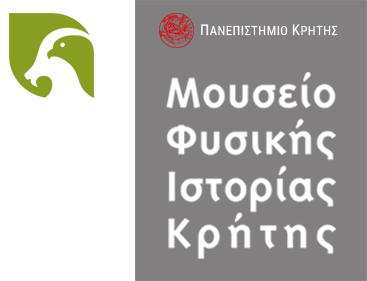The purpose of the NHMC is:
- The preservation and enrichment of collections and records related to the environment of its area of activity.
- Research on the environment of Crete, Greece and the wider eastern Mediterranean.
- Environmental education, information and awareness through the dissemination of environmental knowledge to pupils, students and the public.
- The support of the educational project of the University of Crete at the undergraduate and postgraduate level as well as the scientific research of the Foundation.
In order to fulfill its purpose, the NHMC:
- Creates, develops, maintains and digitizes collections (geological, paleontological, botanical, zoological, genomic).
- It maintains and develops documentation files such as studies, scientific papers, photographs, audio files and other material related to the timelessness of the environment of the wider area to which it belongs.
- It researches and studies a) the biology and ecology of species, as well as the structure and function of the habitats and ecosystems of its area of activity with an emphasis on areas and species that need special management and protection, b) geodiversity, rocks, minerals and fossils.
- Performs salvage or scheduled excavations, in accordance with current legislation. In the context of these activities and in collaboration with the Department of Biology, other Departments of the University of Crete and other Universities of the country and abroad educates undergraduate and postgraduate students.
- It transmits environmental knowledge through lectures, seminars and educational programs, and through the permanent exhibition based in Heraklion and through periodic exhibitions.
- It plans and maintains botanical gardens and preserves animal and plant breeding facilities for exhibition purposes, research and educational purposes, and the care of endangered species.
- Submits and prepares research and educational programs, as well as studies that are consistent with the aims and objectives of the Museum.
- It provides services to public and private sector entities.
The Museum maintains permanent exhibition and educational spaces in Heraklion, Crete. The permanent exhibition of the Museum shows the particularities of the Cretan environment in relation to the rest of Greece and the Eastern Mediterranean. The exhibition has an educational character and is addressed to pupils, students and the public. In parallel with the exhibition, the Environmental Training Center (E.T.C.) operates with the aim of environmental education for pupils, students and various categories of workers and unemployed.
The NHMC is the only natural history museum in Greece that is a member of CETAF (Consortium of European Taxonomic Facilities) and participates in one of the largest research infrastructures in Europe, DiSSCo (Distributed System of Scientific Collections) which is already one of the programs of the European Strategy Forum for Research Infrastructures (ESFRI). DiSSCo represents the largest formal association of Natural History Collection (NHC) holders in the world. In Greece, DiSSCo has received a letter of support from the Research Infrastructures Authority. The NHMC has been designated as the National Representative in the above partnerships, leader of the corresponding Greek partnership, which counts numerous partners (Greek Universities, and museums/organizations that maintain NHC).



 Ελληνικά
Ελληνικά